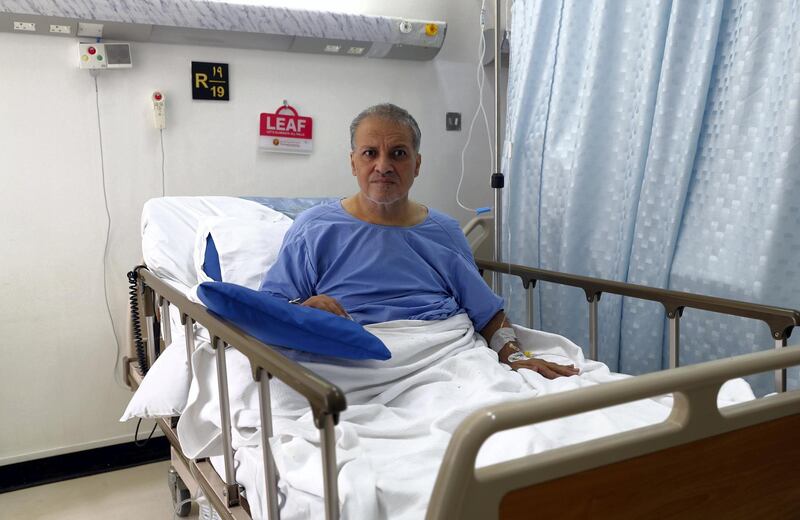A mother and her paralysed son who were forced to live in "wretched" conditions for years have been provided with accommodation and medical assistance after the Ruler of Ajman came to their aid.
Essmat Mousa Badawiya, believed to be in her late seventies, and her son Ashraf Abdul Majeed, 48, have been living in a miserable situation for nearly 20 years. Ashraf has suffered from paraplegia since childhood and can’t take care of himself or his mother.
A video circulating on social media showed the elderly mother, who also can’t walk, and her paraplegic son living in an home in a state of disrepair, wrecked by water leaks, damaged furniture and walls.
The video was taken by one of the people providing them with food and financial help and has sparked a life-changing intervention.
بعد انتشار فيديو يوضح الظروف الصعبة لأسرة عربية في عجمان حاكم إمارة عجمان حفظه الله يأمر بتوفير كافة احتياجات أسرة
— 🌐 احمد سيف المهيري (@AALMUHIRI) June 14, 2018
( أم أشرف) تشمل :
سكن جديد
علاج كامل
مصاريف يوميه
كهرباء والماء مجاناً
جعله الله في ميزان حسناتك يا بوعمار ويبعد عنك كل سوء . pic.twitter.com/7o8A3vIkcK
After the video was shared on social media, Sheikh Humaid bin Rashid Al Nuaimi, the Ruler of Ajman, ordered that the pair be provided with medical care and a new home.
The National visited Ms Badawiya and Ashraf, who have been admitted to Thumbay Hospital in Ajman, together with relatives who came to support them. Ms Badawiya's daughter, Eman Abdul Majeed, arrived in the UAE on Saturday and has accompanied them at the hospital.
Mrs Abdul Majeed, a 50-year-old Palestinian living in Gaza, said: “I was shocked to see my mother and brother in such a wretched situation. I regularly contact my mother and she complained about her medical, financial and living situations. However, I did not expect the situation to be that bad.”
“Living in Gaza deprives me from travelling regularly due to the closure of the Gaza’s crossings and the deteriorating economic condition.
“I came to the UAE through the Rafah border crossing, which is the sole crossing between Egypt and Gaza Strip. It was very difficult. It’s not easy for Palestinians to reach Egypt. Thankfully, I did and travelled from there to Sharjah,” she said.
Mrs Abdul Majeed said that her husband had to borrow $2,000 (Dh7,350) to afford her trip.
“I saw the video when I was in Egypt. My heart was broken,” said Mrs Abdul Majeed.
Explaining her brother’s heath condition, Mrs Abdul Majeed said: “Ashraf currently suffers from a brain stroke. He does not go out, can’t move and does not communicate with others. Thus, his health condition deteriorated further.”
_______________
Read more:
[ Emirati toddler badly burned in cooking accident helped after appeal to leadership ]
[ Ruler of Dubai helps friends stranded in the desert ]
_______________
Mrs Abdul Majeed said her mother and brother’s residency visa are sponsored by the Ruler’s Court.
Ashraf worked in Awqaf in Sharjah 10 years ago. He was involved in a car accident, which worsened his medical situation.
Ashraf and Mrs Abdul Majeed were born in Egypt. He was given the wrong Polio vaccination, which caused him to become paraplegic.
“My mother did not know that he could be treated. She is uneducated," said Mrs Abdul Majeed.
"My parents were divorced when I was about 9-years-old and my father granted full custody of me. My brother, Ashraf, chose to live with my mother. At that time, Sheikh Humaid gave the home they were living in to them for free. Their home was in a much better condition then," said Mrs Abdul Majeed.
"I got married when I was very young. More than 15 years ago, I moved with my husband to Gaza in Palestine. Our life is very hard in Gaza as well.
I visited them once almost 10 years ago and I try to do my best by communicating and checking on them regularly,” she said.
When asked about her mother's age, Mrs Abdul Majeed said: "I do not know, as my mother is not aware of how old she is. Doctors examined her and predicted that she's 79 yeards old."
She said she would be forever grateful to Sheikh Humaid for his help.
“I thank the Ruler of Ajman for supporting my family and providing them with medical assistance and a new home.”






